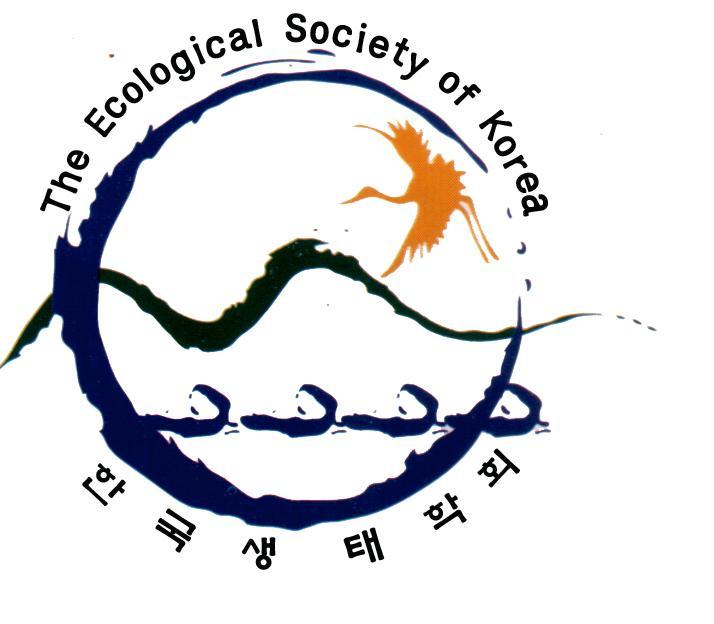- ENGLISH
- P-ISSN2287-8327
- E-ISSN2288-1220
- SCOPUS, KCI
 ISSN : 2287-8327
ISSN : 2287-8327
낙동강 하구의 수생관속식물의 분포 변화와 수금류(고니류)의 먹이식물인 세모고랭이의 성장 변화
Change of Distribution of Vascular Hydrophytes in the Nakdong River Estuary and Growth Dynamics of Schenoplectus trqueter, Waterfowl Food Plant
이찬우 (부산대학교)
윤혜순 (동아대학교)
주기재 (부산대학교)
Abstract
A study on changes on the distribution of vascular hydrophytes and the growth pattern ofSchenoplectus triqueter (Scirpus triqueter) was undertaken at the Nakdong River estuary from 2002 to 2004. The change was due to physical alteration of the estuary for the past 25 years. These plant species are the major food sources for winter waterfowl. A total of 32 species of vascular hydrophytes from 17 families were found Estuary (brackish water). After the construction of the barage on the estuary in 1987, the number of hydrophytes has remarkably increased to 17 species (5 species in 1985) in the main channel of the River. In particular, a comunity of Eurale ferox was found at the backwater wetland of the Daejeo side of the main channel. The introduced species of Eichhornia crassipes and Pistia stratiotes that were epidemic in 2001 at West Nakdong River was not found any more. The other species such as Nymphoides indica , Myriophyllum spicatum, Ruppia spp. were rediscovered. The large area (about 1,300ha) of Zostera sp. was the main sources of food for swans, but disappeared because of direct and indirect impacts of reclamation in the River estuary. Curently, there remains a small patch of Zostera spp. and about 250ha of S. triqueter. Schenoplectus triqueter grew mostly between April-September and tuber formed, between September~October. The growth of S. triqueter up to 60~80cm in length was observed in 5 sites out of the 7 sites in brackish area. Tubers of S. triqueter were eaten by waterfowls such as swans as winter food. In five sites, tubers took 44~57% of total biomass in October. Tubers were found in deep layers; 5~15cm (9%), 15~25cm (28%), 25~40cm (55%), below 40cm (6~7%). The reclamation of the area. In order to determine the extent of changes of the distribution of these plants and the carrying capacity of the area for waterfowl, an intensive research is urgently needed.
- keywords
- Nakdong River estuary, Schenoplectus triqueter (Scirpus triqueter), Vascular Hydrophytes, Zostera spp., Nakdong River estuary, Schenoplectus triqueter (Scirpus triqueter), Vascular Hydrophytes, Zostera spp.
참고문헌
(1991) 의 생육습성,
(2001) 남해안 잘피 서식지 현황 및 복원 방안,
(2003) 대한식물도감, 향문사
(2001) 하구/석호 육해전이수역 통합환경관리방안연구 , 한국환경정책평가연구원
(1987) 낙동강하구에서의 수금류 식이식물의 현존량과 이용에 관한 연구,
(1991) 낙동강하구 간석지의 수생관속식물에 관한 연구 하구둑 건설 전후의 간석지 식생의 생산성 비교,
(2002) 서낙동강 수질의 이화학적 특성과 수생관속식물의 분포,
(1983) 낙동강하구의 습생식물 및 수중식물 구계와 분포,
(1985) 낙동강수계의 수생관속식물상과 현존량,
(2000) 새섬매자기의 출아 및 생육특성,
(2000) 수생관속식물, 220 p
(1993) 낙동강 하구둑 축조 후의 수생관속식물군집의 변화에 관한 연구, 37 p
(1976) The ecology of eelgras,
(1995) Removal of organic mater and nutrients from urban wastewater by using an experi-mental emergent aquatic macrophyte system,
(1984) A field study of the growth dynamics and productivity of Posidonia oceanica in Calvi Bay,
(1997) Field and Laboratory Methods for General Ecology, McGraw-Hill Publishers Ltd
(2005) The interacting effects of temperature and plant community type on nutrient remo-val in wetland microcosm,
(1997) Restoration of Scirpus lacustris and Scirpus maritimus stands in a former tidal area,
(1994) Distribution and growth of the helophyte species Phragmites australis and Scirpus lacustris in water depth gradients in relation to wave exposure,
(1996) Effects of waves on helophyte stands mechanical characteristics of stems of Phragmites australis and Scirpus lacustris,
(1996) Growth and morphological responses of four helophyte species in an experimental water-depth gradient,
(1997) The value of the world's ecosystem services and natural capital,
(1991) Human activities and wildlife conservation on es-2005년 10월 낙동강 하구 수생관속식물의 분포 변화와 세모고랭이 성장 345tuaries of diferent sizes,
(1986) Preliminary results of the bota-nical,
(1997) The impact of grubbing by Greylag Geese on the vegetation dynamics of a tidal marsh,
(1987195-204) Factors influencing aboveground pro-duction of Scirpus marshes in the St,
(1998) Four helophyte species growing under salt stress their salt of life?,
(1991) Intraspecific comparisons of biomass dynamics in Scirpus americanus and Scirpus maritimus on the Fraser River Delta,
(2004) Aquatic Plants of Japan, Ltd
(2004) Growth pattern of Scirpus triqueter after wintering swans foraging activity Proceedings of the 7th INTECOL International Wetlands Conference,
(2004) Comparative study wintering Swan habitat use patern in two wetlands Proceedings of the 7th INTECOL International Wetlands Conference,
(1998) Water level afects growth of endangered northeastern bulrush,
(200219-26) Effects of Substrate Salinity on Early Seedling Survival and Growth of Scirpus robustus Pursh and Spartina alterniflora Loisel,
(2003) Salinity as major factor affecting Scirpus maritimus annual dynamics evidence from field data and greenhouse experiment,
(1967) Observation of circulation in costal plain estuary American Asociation for the Ad-vancement of Science, Publishers Ltd
(2002) Estuarine and tidal wetland restoration in the United Kingdom,
(1967) The Biology of Aquatic Vascular Plants, Publishers Ltd
(1996) Natural and human-induceddisturbances of seagrass,
(2002) Elements of Ecology, Benjamin-Cummings Publishers Ltd
- 다운로드 수
- 조회수
- 0KCI 피인용수
- 0WOS 피인용수

